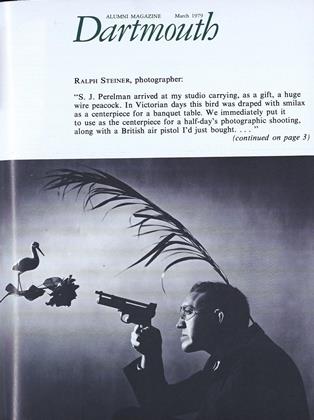Nelson Rockefeller
It was easy to be cynical about his wealth and power. And it was easy to view Dartmouth's conferral of three honorary degrees and a Trusteeship on this one alumnus as transparent attempts to share his wealth and power. In the case of Nelson Rockefeller and Dartmouth, however, the cynics miss the truth.
The man who became four-term governor of the nation's richest, most complicated state, who three times tried for the Presidency, who commanded vast resources of his own, entered Dartmouth in 1926. He was the grandson of John D. Rockefeller, a name, as President Dickey once said, "behind whose renown many would doze." If there was surprise that a Rockefeller chose a small, rural college, his father had an answer: "Once I said to one of my sons, 'If I were looking for a college, I would find out what college Dr. Hopkins is president of, and go there.'"
Nelson Rockefeller did not doze at Dartmouth: Phi Beta Kappa, Palaeopitus, Green Key, Cabin and Trail, class vice president, Casque and Gauntlet, soccer, president of "The Arts," editor of Pictorial, Psi Upsilon, Senior Fellow. There was righteous indignation - as a freshman he wrote a long letter criticizing the "hypocrisy" of the fraternity system (later he joined Psi U and made lifelong friends there). There was self-parody - he posed as a grasping taxi driver in a take-off on Don Juan. There was enthusiasm for the outdoors and for learning. He majored in economics but gave it up (it was too much like working for money, he said) when selected for the first group of Senior Fellows.
Just before graduating, he wrote in the ALUMNI MAGAZINE that the Senior Fellowship had changed his whole attitude toward education. "It is no longer the old game of just doing enough work to pass exams and get good marks.... I have been working for the personal joy and the satisfaction derived from it. There are new fields to be explored, past histories to unfold, paintings new and old to see. I don't claim to have sprouted wings...but I have developed a growing enthusiasm and appreciation which will stay with me." That last undergraduate year was spent in an intense, freewheeling exploration of art, and Rockefeller never forgot his lessons. Less than a year before he died, he told a New York Times interviewer that "art has been a major factor in my life, my joy and distraction, my balance under the pressures of political life."
In 1942, he was elected to his first term as an alumni Trustee, then the youngest Trustee in modern times. In Washington during the war, he worked in the State Department with a Dartmouth contemporary, John Sloan Dickey '29, who within a short time became President of Dartmouth. Other wealthy, powerful, politically motivated men might have neglected their old college, their old college friends. Rockefeller served ten years as a Trustee, put on picnics for his class, spoke at the Great Issues course, went to football games, guided Hopkins Center to its completion, exuberantly presided over dinners 20 years apart honoring his friends Ernest Hopkins and John Dickey, wrote warm letters to former teachers and their wives. He immersed himself in Dartmouth, as John Dickey characterized his life, with "a fierce sense of determination."
There were gifts, too. Funds for the Public Affairs Center, funds (as well as personal energy) for Hopkins Center, many anonymous donations. He was proud of Hopkins Center, and he delighted in bolstering what had given him so much satisfaction in 1930 - the art program. His last gift to the College, for the Campaign for Dartmouth, was a Picasso oil painting.
In Dartmouth terms, what distinguished Nelson Rockefeller was his kinship with so many other loyal alumni. He cared deeply for the place, he took so much from it, he gave a great deal to it. This is not to suggest that he was one of the regular guys. He wasn't.
In 1974, when his classmate became Vice President of the United States, Francis Horn '30 wrote for the ALUMNI MAGAZINE: "Nelson was, as I recall, elected by our class as the one most likely to succeed in life. He had quite a start over most of us - not just in family and finances but in brains, health, industriousness, and the many other qualities I have spoken of. But he could have flubbed it, even with all the advantages he had. Instead, he has more than lived up to our expectations."
With Professors Laing and Wilson at Great Issues, campaigning for President in front of Dartmouth Hall and Tanzi's store.
 View Full Issue
View Full Issue
More From This Issue
-
 Feature
FeatureNine to Midnight (or two if hot)
March 1979 By Shelby Grantham -
 Feature
FeatureSTEINER: by himself
March 1979 -
 Books
BooksNotes on lost causes and an enlistment against Nature, as brave as it was brief.
March 1979 By R. H. R. -
 Article
ArticleWinter Carnival Blues
March 1979 By Biĺ Conway '79 -
 Article
ArticleLiberal Learner
March 1979 By M.B.R. -
 Class Notes
Class Notes1974
March 1979 By STEPHEN D. SEVERSON
D.A.D.
Article
-
 Article
ArticleDARTMOUTH IN TURKEY
April, 1914 -
 Article
ArticleC. B. LITTLE '81 NAMED AS LIFE TRUSTEE
December, 1925 -
 Article
ArticleFinancial Prospects Critical
March 1942 -
 Article
ArticleY & R's Unique Tribute to Sig Larmon '14
FEBRUARY 1963 -
 Article
ArticleFall Reunions
September 1976 -
 Article
ArticleLOOK WHO’S TALKING
SEPTEMBER | OCTOBER 2015 By —Lisa Furlong




